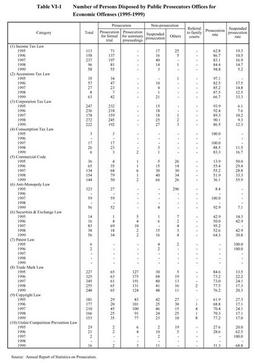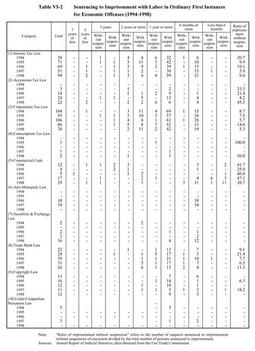| Previous Next Index Image Index Year Selection | |
|
|
1 Disposition by Public Prosecutors Offices(See Table VI-1 )
This section outlines trends in final disposition of economic offenses by public prosecutors offices over the last five years. (1)Income Tax Law, Accessions Tax Law, Corporation Tax Law, and Consumption Tax Law violations Prosecution rates for Income Tax Law, Accessions Tax Law, Corporation Tax Law and Consumption Tax Law violations have remained within the80%and90%ranges. Few of those accused have received a final disposition of non-prosecution for reasons other than suspension of prosecution. Table VI-1 Number of Persons Disposed by Public Prosecutors Offices for Economic Offenses(1995-1999) (2)Commercial Code, Anti-Monopoly Law, and Securities&Exchange Law violations The prosecution rate for Commercial Code violations has remained within the30-50%ranges for the past four years. As a whole, formal trial has been requested more often than summary proceedings. As for Anti-Monopoly Law violations, dispositions of non-prosecution were made only for those who were not accused by the Fair Trade Commission. Aside from such cases, formal trial was requested for all suspects. The prosecution rate for Securities&Exchange Law violations has remained within the40-60%ranges except in1997. Formal trial was requested for more than half of those subject to disposition in1997and1999. (3)Patent Law, Trade Mark Law, Copyright Law, and Unfair Competition Prevention Law violations The prosecution rate has remained within the70%and80%ranges for Trade Mark Law violations, and within the60%and70%ranges for Copyright Law violations. The share of requests for summary proceedings is high in both cases. 2Adjudication by Courts (1)Sentencing to imprisonment with labor(see Table VI-2 ) This subsection deals with sentencing by courts for economic offenses in the five-year period from1994to1998. As for Income Tax Law and Corporation Tax Law violations, only about10%of the suspects were sentenced to imprisonment without suspension of sentence. The ratio was higher for Accessions Tax Law and Consumption Tax Law violations, although the number of convicts was smaller. As regards Anti-Monopoly Law, Securities&Exchange Law, and Unfair Competition Prevention Law violations, no defendant was sentenced to imprisonment without suspension of sentence in the same period. (2)Sentencing to fines for Anti-Monopoly Law and Securities&Exchange Law violations Following amendments in1992,the upper limits of fines imposed on corporations, etc. , for Anti-Monopoly Law and Securities&Exchange Law violations were both increased substantially, irrespective of the limits of fines imposed on individual offenders. Between the effective dates of these amendments and the end of1998,a total of34corporations were fined through application of the amended Anti-Monopoly Law following criminal accusations by the Fair Trade Commission, with the amount of fines ranging from¥5million to¥60million. In the same period,5corporations were fined through application of the amended Securities&Exchange Law following accusations by the Securities and Exchange Surveillance Commission, with the amount of fines ranging from¥10million to¥100million. Table VI-2 Sentencing to Imprisonment with Labor in Ordinary First Instances for Economic Offenses(1994-1998) |

